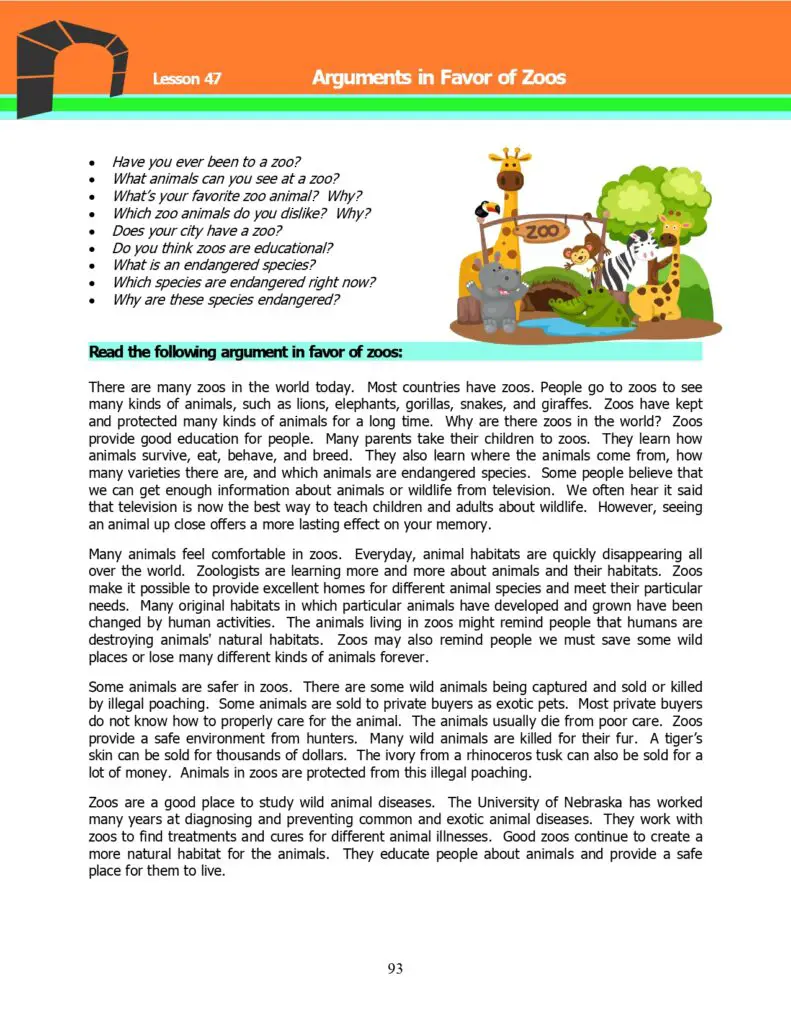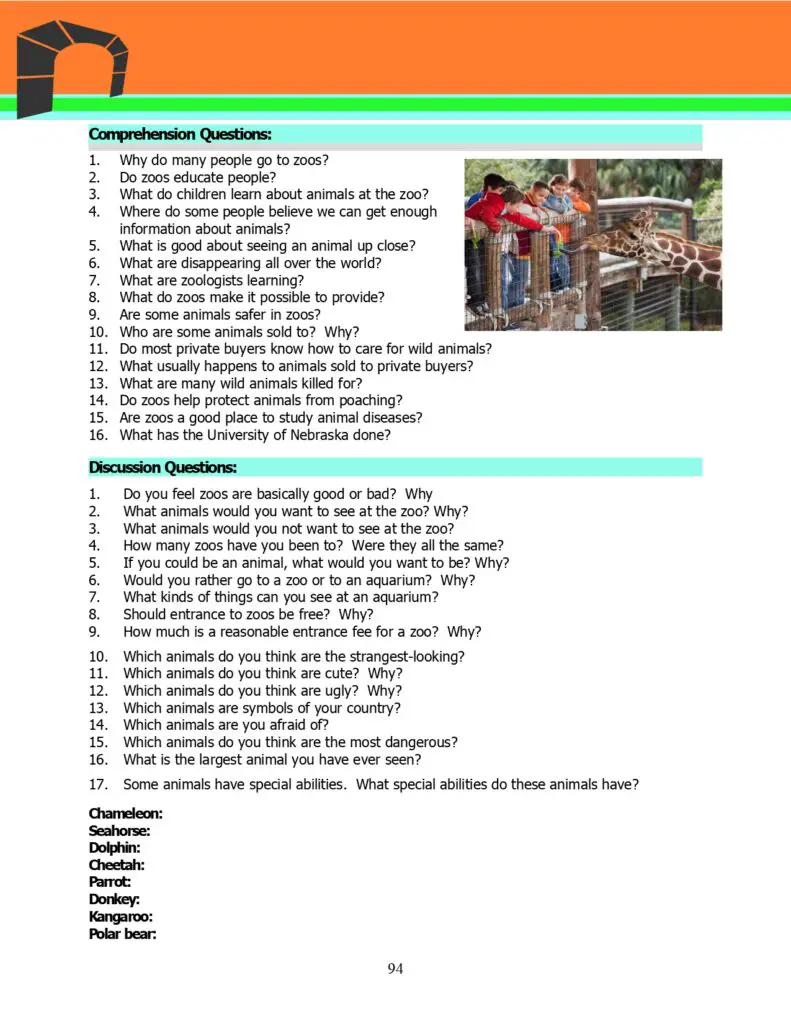This is Lesson 47, “Arguments in Favor of Zoos,” from our book of 48 advanced adult ESL lessons, ESL Pathways: Frontiers. The lesson features an argument in favor of zoos, followed by comprehension questions and discussion questions. This content-packed lesson is useful for helping more advanced English learners refine and improve their English fluency. This lesson is available for free download, and you can download many other ESL lessons for adults like this one in our book ESL Pathways: Frontiers.


ADULT ESL LESSONS: Arguments in Favor of Zoos (Text-Only Version)
- Have you ever been to a zoo?
- What animals can you see at a zoo?
- What’s your favorite zoo animal? Why?
- Which zoo animals do you dislike? Why?
- Does your city have a zoo?
- Do you think zoos are educational?
- What is an endangered species?
- Which species are endangered right now?
- Why are these species endangered?
Read the following argument in favor of zoos:
There are many zoos in the world today. Most countries have zoos. People go to zoos to see many kinds of animals, such as lions, elephants, gorillas, snakes, and giraffes. Zoos have kept and protected many kinds of animals for a long time. Why are there zoos in the world? Zoos provide good education for people. Many parents take their children to zoos. They learn how animals survive, eat, behave, and breed. They also learn where the animals come from, how many varieties there are, and which animals are endangered species. Some people believe that we can get enough information about animals or wildlife from television. We often hear it said that television is now the best way to teach children and adults about wildlife. However, seeing an animal up close offers a more lasting effect on your memory.
Many animals feel comfortable in zoos. Everyday, animal habitats are quickly disappearing all over the world. Zoologists are learning more and more about animals and their habitats. Zoos make it possible to provide excellent homes for different animal species and meet their particular needs. Many original habitats in which particular animals have developed and grown have been changed by human activities. The animals living in zoos might remind people that humans are destroying animals’ natural habitats. Zoos may also remind people we must save some wild places or lose many different kinds of animals forever.
Some animals are safer in zoos. There are some wild animals being captured and sold or killed by illegal poaching. Some animals are sold to private buyers as exotic pets. Most private buyers do not know how to properly care for the animal. The animals usually die from poor care. Zoos provide a safe environment from hunters. Many wild animals are killed for their fur. A tiger’s skin can be sold for thousands of dollars. The ivory from a rhinoceros tusk can also be sold for a lot of money. Animals in zoos are protected from this illegal poaching.
Zoos are a good place to study wild animal diseases. The University of Nebraska has worked many years at diagnosing and preventing common and exotic animal diseases. They work with zoos to find treatments and cures for different animal illnesses. Good zoos continue to create a more natural habitat for the animals. They educate people about animals and provide a safe place for them to live.
Comprehension Questions:
- Why do many people go to zoos?
- Do zoos educate people?
- What do children learn about animals at the zoo?
- Where do some people believe we can get enough information about animals?
- What is good about seeing an animal up close?
- What are disappearing all over the world?
- What are zoologists learning?
- What do zoos make it possible to provide?
- Are some animals safer in zoos?
- Who are some animals sold to? Why?
- Do most private buyers know how to care for wild animals?
- What usually happens to animals sold to private buyers?
- What are many wild animals killed for?
- Do zoos help protect animals from poaching?
- Are zoos a good place to study animal diseases?
- What has the University of Nebraska done?
Discussion Questions:
- Do you feel zoos are basically good or bad? Why
- What animals would you want to see at the zoo? Why?
- What animals would you not want to see at the zoo?
- How many zoos have you been to? Were they all the same?
- If you could be an animal, what would you want to be? Why?
- Would you rather go to a zoo or to an aquarium? Why?
- What kinds of things can you see at an aquarium?
- Should entrance to zoos be free? Why?
- How much is a reasonable entrance fee for a zoo? Why?
- Which animals do you think are the strangest-looking?
- Which animals do you think are cute? Why?
- Which animals do you think are ugly? Why?
- Which animals are symbols of your country?
- Which animals are you afraid of?
- Which animals do you think are the most dangerous?
- What is the largest animal you have ever seen?
- Some animals have special abilities. What special abilities do these animals have?
Chameleon:
Seahorse:
Dolphin:
Cheetah:
Parrot:
Donkey:
Kangaroo:
Polar bear:
